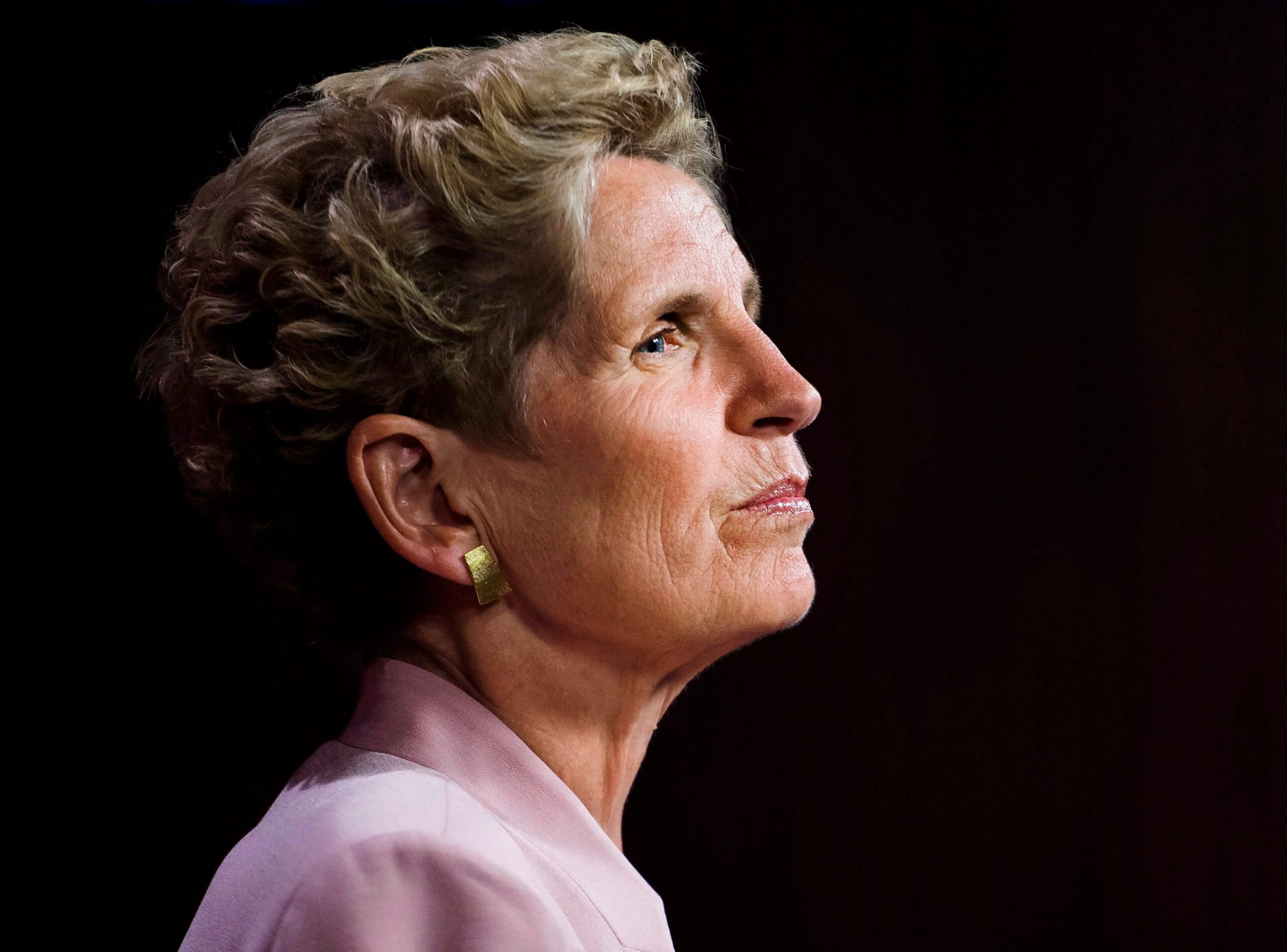When I reach Kathleen Wynne by phone at the end of October, she’s exasperated. It’s not the mood I’d have pegged for a long-time provincial politician who announced she would not seek re-election days prior—I expected some elation, nostalgia even. But Wynne reminds me there’s still work to do: Last month, Doug Ford’s Conservatives tabled legislation to accredit Canada Christian College, run by notorious anti-gay and anti-Muslim political activist Charles McVety, giving the school the right to dole out university degrees. Wynne has sparred with McVety over educational matters before, and frustration is par for the course.
To give up on the battle is not Wynne’s style. Over the past two decades, she’s earned a reputation as a fighter—starting as a school trustee in 1994, then as an Ontario MPP in 2003 and cabinet minister in 2006 before winning the 2013 Liberal leadership race and becoming premier. Despite advisers in the party telling her she couldn’t win, she made history that year, becoming Ontario’s first female premier and the country’s first openly gay premier. And in 2018, she stuck around for the Liberals during a most brutal election; the party lost its official status in the legislature, winning just seven seats. It prompted Wynne to step down as Liberal leader.
That decision, she tells me, wasn’t a tough one. “Once we’d been through what we had been through that campaign, it was quite clear to me that it was time for me to step down,” the 67-year-old says.
But her next step—bringing her provincial politics career to a close—was more difficult to make, even if some pundits wonder why she stayed at all. There’s still plenty to do, she says; she’ll stick around until the 2022 election to cross off the last of her to-do list. Of most pressing concern: Making Ontario’s education system a safer, more equitable space for students of all backgrounds.
That’s been Wynne’s modus operandi for decades, since she first ran for school trustee in the early 1990s. It was the start of a gruelling years-long confrontation with homophobia: Opponents sent out flyers calling Wynne a “lesbian extremist.” It wasn’t unanticipated; Wynne had sat down with her then-elementary school-aged kids to warn them that they might hear some awful things about their mom. She lost that race but wasn’t discouraged. She again put her name on the ballot in 2000 and won.
“I wasn’t involved in politics because I was a gay activist. I was involved because I believe in a more equitable society”
Wynne continued to weather discrimination as she ascended through the ranks, noting that she experienced homophobia in every election she ran in. But when I ask her about queer representation, she’s quick to correct my assumptions: “I wasn’t involved in politics because I was a gay activist,” she says. “I was involved in politics because I believe in a more equitable society.”
Persevering through the hate, however, has given Wynne an uncommon position in the world of Ontario politics, where few out queer candidates are elected—and she’s made a tangible, legislative difference for queer and trans youth. As minister of education in 2010, she worked with educators to develop an inclusive sex-ed curriculum for the province, with particularly forward-thinking lessons on LGBTQ2S+ issues. Wynne’s efforts were thwarted after backlash prompted then-premier Dalton McGuinty to pocket the curriculum, but she revived it five years later when she herself was premier. Wynne also led the charge to pass the Accepting Schools Act in 2012, ensuring that students at all publicly funded schools in Ontario could start a gay-straight alliance if they so pleased.
“I believe that the publicly funded education system is where we level the playing field,” she says. “We have an opportunity with the system to actually create a different kind of society.”
When I ask Wynne if she’s worried about the state of Ontario’s education system—especially since Premier Ford tried to reverse her hard-fought sex-ed curriculum when elected in 2018—she does not mince words. “I really worry about what they are going to do in terms of equity policies in education,” she says. “I’m very worried about what they even believe in in terms of publicly funded education.”
“There’s a role for us to play in terms of supporting young people”
So why leave politics at such a high-stakes moment? Wynne says it’s an opportunity to usher in a new cohort of political leaders—particularly the young people whose education she’s so impassioned about. Training youth, whether formally or informally, is about all she has planned after 2022. “I believe, because the political arena is pretty toxic right now, it’s a pretty daunting thing to take on the role of being a candidate, to put your name on a sign and subject yourself to that public scrutiny,” she says. “There’s a role for us to play in terms of supporting young people.”
Until then, she’s focused on the present. She’s still preoccupied with McVety and Bill 213, which had a second reading in the legislature a few days before we speak. She’s insistent that an institution run by someone with ties to homophobia and Islamophobia shouldn’t be granted greater privileges.
This, among decades of political work, has always been Wynne’s greatest strength: representing the marginalized. I ask if that representation feels burdensome, to always feel the pressure to protect other minority communities. This, she tells me, is the wrong frame of mind. “I don’t see it as a burden,” she says. “I see it as an opportunity.”


 Why you can trust Xtra
Why you can trust Xtra


